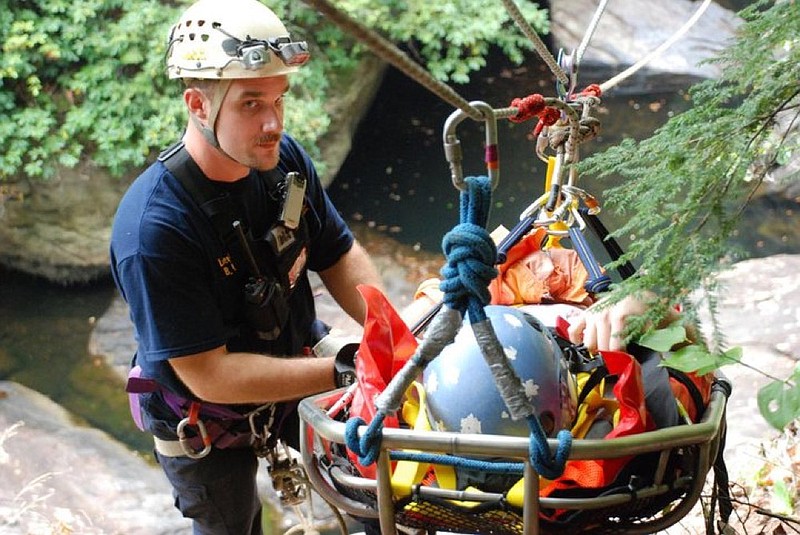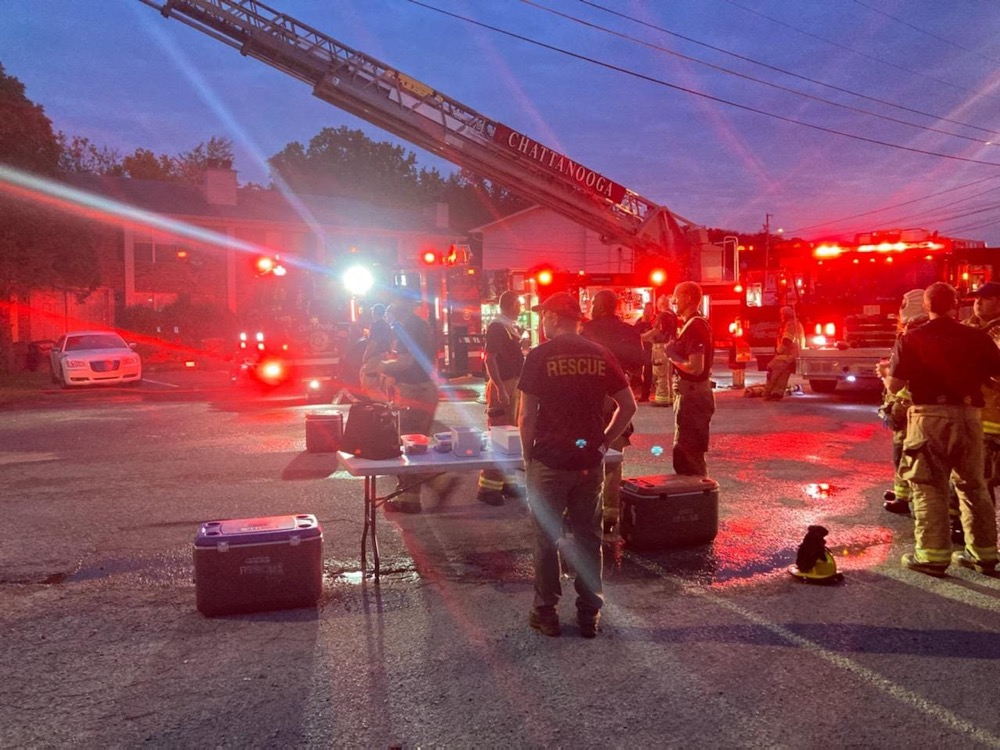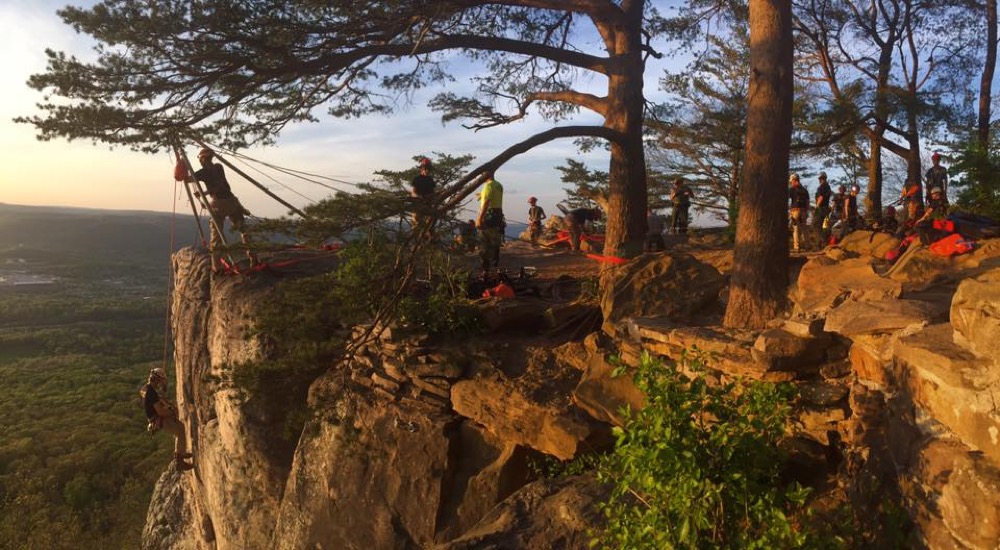A person needs more than navigational skills or medical training to join a search-and-rescue team.
"You have to have a willingness to drop everything for a stranger in need," says Brad Tipton, captain of the Chattanooga-Hamilton County Rescue Service.
And, he adds, to join CHCRS, "you have to be willing to do it for free."
CHCRS is a volunteer first-responder organization that provides specialized services such as cave, cliff, swift-water and ground search and rescues. In addition, the nonprofit offers emergency rehabilitation services to other first responders. Through mobile units, the goal of the latter is to provide relief - food, water and places to sit, for example - to on-scene police and firefighters.
"When Patten Towers caught on fire (in March), firefighters were on scene for the better part of eight to nine hours. They can only be inside for so long before the chief has to force them out to rehab," Tipton explains. "We were there to help get them refreshed so they could go back in."
Currently, CHCRS comprises a team of 65, all of whom work for free, including Tipton.
He joined the rescue team in 1997, at age 18, the same year he took a job with Pilgrim's Pride.
"I've worked for Pilgrim's Pride for 24 years now, and I've never taken a promotion without putting it out there that my rescue [work] is very important to me. My employer has always been supportive, which means I don't have to worry about missing work during [rescues]," Tipton says.
Calls, after all, can come at any time and last for hours or even weeks.
In May, when a hiker went missing in Laurel-Snow State Natural Area, Tipton and his team spent 60 hours conducting ground searches that first week.
"I wore blisters on my feet from walking," he says.
Eleven days later, the hiker's body was found, and Tipton and his team were called back in to help retrieve the missing man.
"Rescues really are never fun. We suffer a lot. It's uncomfortable," says Tipton. "This is a team effort.
"You can have a person with the most incredible resume, but if they don't have the drive to serve, no matter the capacity, they're not going to be a good fit (for this team)."
Here, in his own words, Tipton shares his path to search-and-rescue as well as revelations about life and death inspired through his service.
^^^
> I guess I was a rambunctious teenager. My grandfather found out that I had been tearing up the neighborhood and sat me down and said, "It'd be a good idea if you found a job."
> I lived in Lookout Valley and one of my friends was a tour guide at Raccoon Mountain Caverns. He helped me get a job over there. Caves became very interesting to me, and that caused me to springboard into visiting wild caves around town. Not long after that, I started getting out with some seasoned cavers.
> I've visited some odd 1,800 caves in the (Tennessee-Alabama-Georgia) region.
> My passion is vertical caving, rappelling. I enjoy a nice deep pit.
> When I joined the team in 1997, I was 18. Most of the folks back then were in their 20s. Now, most folks that come to me are in their 30s or beyond that. It's rare to have folks under the age of 30 anymore.
> Recruiting in the 21st century has become very different. There is a different mindset now. I think maybe that has to do with the culture of this generation - that need to be compensated. But as you get older, you realize that life enrichment comes from more than just getting paid.
> When you're a volunteer organization, you have to be willing to drop everything you're doing - whether that's Netflix or your job.
> Right now we have 65 people at the rescue service. The majority of those guys are cross-trained in multiple disciplines. The cave team has 40 people; the swift-water team has 12. Our [search-and-rescue] team has about 15.
> Chattanooga draws folks from all over the country, and in some cases the world. We have some of the best climbing in the region, some of the best kayaking in the world, and the greatest wealth of limestone caves in the Western Hemisphere. All those disciplines I just named require training and experience, and there is a wealth of that available out there, too. Join organizations, chat rooms, Facebook groups. Use the tools available in the 21st century. It takes a lot of pressure off your local first responders when you take the time to learn to have these experiences safely.
> We get a lot of folks lost on Lookout Mountain. It's surrounded by city, but you get folks that want to go hiking at 7 p.m., or that run out of cellphone juice and can't navigate without it.
> Cave rescues are almost always the result of gravity. High falls, head trauma, pelvic trauma, broken femurs.
> Our cave rescue team has been to almost every state in the Southeast. And a lot of the time, we're doing multi-day rescues. We have to get to the patient, stabilize them and prepare them for the haul out - sometimes you have to do all that 20 hours below the surface.
> I would put my reputation on the line to say that our [cave rescue] team is probably the best in the Western Hemisphere. There are not any cave teams in the U.S. that compare to what we do.
> In every rescue, there is almost always a friend or spouse that had to experience that [incident] in real time. Because it almost always happens in a wilderness setting, they have to just sit there until we can get to them, wondering if their loved one is going to survive.
> When you have to pull that loved one away from the injured person - that's when you realize that what you're doing doesn't just impact that injured person. It affects an entire generation of people that loves that person. I may never get to speak to the patient, but the loved ones watching - they know what we did. It is a far-reaching effect when you save a person's life.
> It's not really about me. This is a team effort. The only reason I'm successful is because my team is a group of exceptional rescuers. I'm just the guy who keeps them going in the same direction.
SAVE THE DATE
The Chattanooga-Hamilton County Rescue Service is planning an outdoor fundraiser for spring 2022. “Pours & Chords for the Outdoors” will be hosted at the Chattanooga Brewing Co., bringing together dozens of outdoor organizations and businesses with live music and beer. Help celebrate the outdoor community — and support the volunteers and their life-saving services.As a nonprofit, CHCRS relies on public donations to keep itself running — from maintaining its fleet of emergency vehicles to acquiring top-of-the-line hardware and rescue equipment. During the event, a portion of the beer and food sales will be donated to CHCRS, plus all proceeds from the silent auction.Learn more about CHCRS at chcrs.org.


